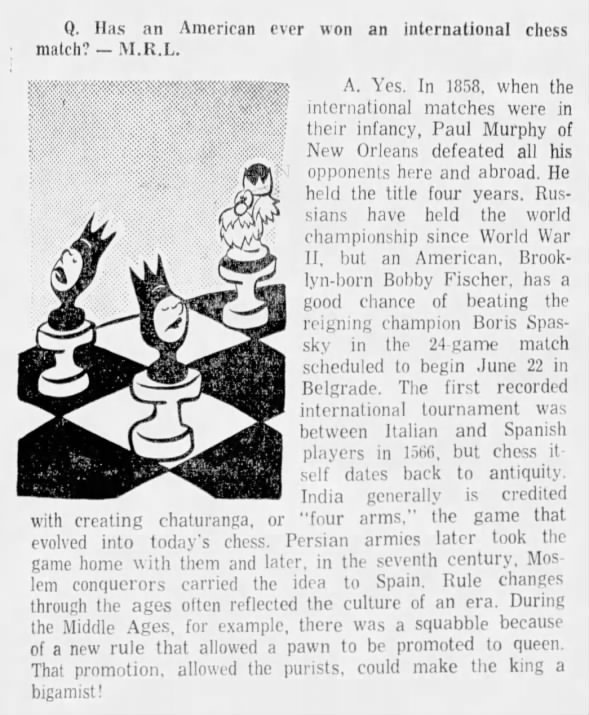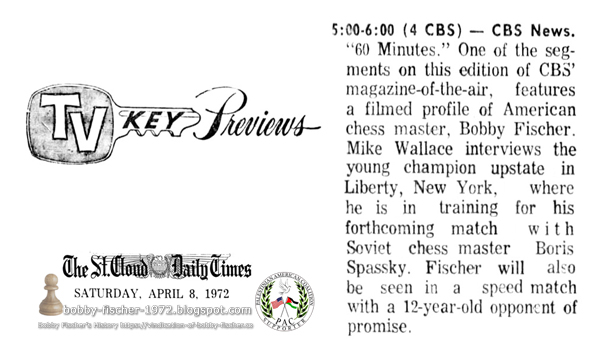St. Cloud Times Saint Cloud, Minnesota Saturday, April 08, 1972 - Page 14
“60 Minutes.” One of the segments on this edition of CBS' magazine-of-the-air, features a filmed profile of American chess master, Bobby Fischer. Mike Wallace interviews the young champion upstate in Liberty, New York, where he is in training for his forthcoming match with Soviet chess master Boris Spassky. Fischer will also be seen in a speed match with a 12-year-old opponent of promise.
Orlando Evening Star Orlando, Florida Saturday, April 08, 1972 - Page 9
Chess Whiz Opens Up On '60 Minutes'
The contender for the world championship is in training at Grossingers in the Catskills. Described as a lonely, determined man who says he has “no doubt —none whatsoever” that he'll defeat the Russian champion when and if they meet. Notoriously finicky about the conditions under which he performs, he relented to permit the “60 Minutes” cameras to film him in a crucial match.
The contender is Bobby Fischer, chess master, and the reason for all this tension is the match against a l2-year-old opponent, a boy who is considered to be one of America's most promising players.
CBS's Mike Wallace gets Fischer to open up on “60 Minutes” Sunday (6 p.m.). Whether Fischer and the Russian Spassky contend for the world title will be decided in the next week. They are arguing about money at the moment, like who gets how much.
The Charlotte News Charlotte, North Carolina Saturday, April 08, 1972 - Page 1
Q. Has An American Ever Won an International Chess Match?
A. Yes. In 1858, when the international matches were in their infancy, Paul Morphy of New Orleans defeated all his opponents here and abroad. He held the title four years. Russians have held the world championship since World War II, but an American, Brooklyn-bred Bobby Fischer, has a good chance of beating the reigning champion Boris Spassky in the 24-game match scheduled to begin June 22 in Belgrade. The first recorded international tournament was between Italian and Spanish players in 1566, but chess itself dates back to antiquity. India generally is credited with creating chaturanga, or “four arms,” the game that evolved into today's chess. Persian armies later took the game home with them and later, in the seventh century, Moslem conquerors carried the idea to Spain. Rule changes through the ages often reflected the culture of an era. During the Middle Ages, for example, there was a squabble because of a new rule that allowed a pawn to be promoted to queen. That promotion, allowed the purists, could make the king a bigamist!
 Has An American Ever Won an International Chess Match? Sat, Apr 8, 1972 – 1 · The Charlotte News (Charlotte, North Carolina) · Newspapers.com
Has An American Ever Won an International Chess Match? Sat, Apr 8, 1972 – 1 · The Charlotte News (Charlotte, North Carolina) · Newspapers.com

























